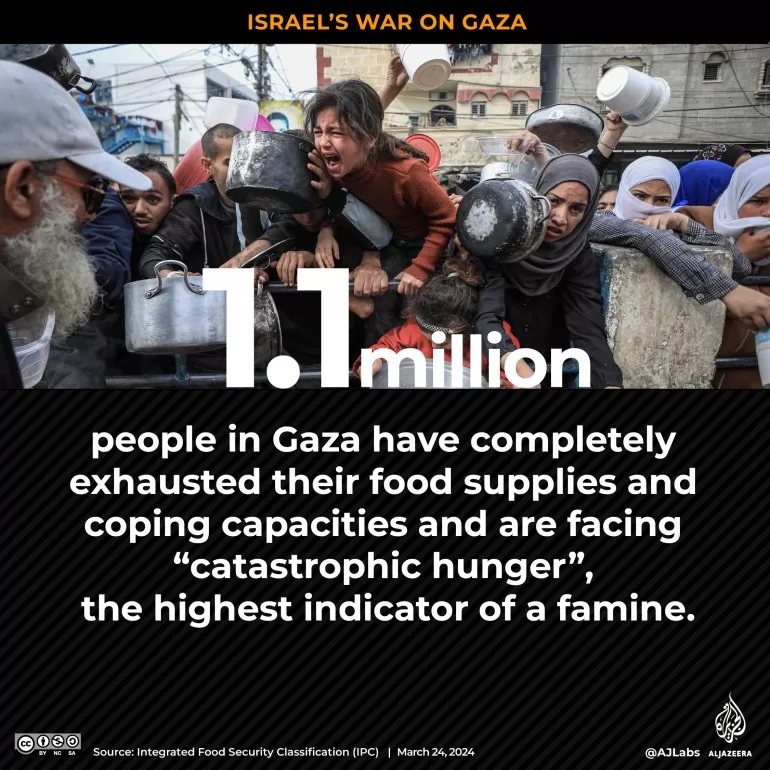“While we conduct our important military actions, the defence establishment is simultaneously assessing a governing alternative to Hamas,” Defence Minister Yoav Gallant said in a statement on Sunday.
“We will isolate areas, remove Hamas operatives from these areas, and introduce forces that will enable an alternative government to form – an alternative that threatens Hamas,” Gallant added.
“On one hand, military action and on the other the ability to change the government. [This] will lead to the achievement of two of the goals of this war: the dismantling of the Hamas government and its military power, and the return of the hostages. We will not accept the rule of Hamas in Gaza at any stage in any process aimed at ending the war.”
Pressure is mounting on Israel’s government after Biden announced the proposal on Friday, saying it was an “Israeli” truce deal and urging Hamas to accept it. The group that has governed the Gaza Strip since 2007 reacted “positively” to the US president’s statements.
Israel’s war cabinet meets later on Sunday.
Far-right Israeli Finance Minister Bezalel Smotrich and National Security Minister Itamar Ben-Gvir have vowed to quit the Benjamin Netanyahu-led government if the ceasefire proposal is accepted.
“The deal … means the end of the war and the abandonment of the goal to destroy Hamas. This is a reckless deal that constitutes a victory for terrorism and a security threat to the state of Israel,” said Ben-Gvir.
Ophir Falk, Israel’s senior foreign policy adviser, said Biden’s plan is a “deal we agreed to – it’s not a good deal, but we dearly want the hostages released, all of them”.
‘Every expectation Israel would say yes’
Yossi Beilin, a former cabinet minister and peace negotiator, said even if the far-right members quit the government it can still survive if the parties of opposition leader Yair Lapid and Benny Gantz replace them.
“The right-wing government is causing us huge problems. It was a political decision by Netanyahu, who just three years earlier rejected joining them. But since he needed them to have a majority and again become prime minister, he agreed to something he never should have agreed to,” Beilin told Al Jazeera.
“If this deal is eventually connected to a larger regional deal, according to the Arab [Peace] Initiative of 2002 and the readiness of the Saudis, this will be his most important legacy. Otherwise, his legacy will be very disappointing.”
White House national security spokesperson John Kirby said if Hamas agrees to Biden’s ceasefire proposal to end the war, the United States expects Israel to also accept the plan.
“This was an Israeli proposal. We have every expectation that if Hamas agrees to the proposal – as was transmitted to them, an Israeli proposal – then Israel would say ‘yes’,” Kirby said in an interview on the ABC News programme This Week.
More than 100,000 Israeli demonstrators took to the streets of Tel Aviv on Saturday demanding that the Netanyahu-led coalition sign on to the truce proposal.
‘Catastrophic’ hunger spreads in Gaza
Pressure is mounting on Israel and Egypt to reopen land crossings that connect to Gaza to allow desperately needed aid deliveries. Hundreds of aid trucks have been stuck in Egypt with food supplies rotting for weeks after Israel took control of the crucial Rafah crossing last month.
“The closure of the nine possible potential crossings is a catastrophe,” Ahmed Bayram, spokesman for aid group the Norwegian Refugee Council, told Al Jazeera.
“We hear on a daily basis from our teams that children are sleeping on the sands because there are no tents left, they are drinking unsafe water all day long, and they are eating very, very little.”
Even before Israel took control of the Rafah crossing, the number of aid trucks entering Gaza was far below the total needed. The United Nations says at least 500 to 600 trucks are required daily to feed hundreds of thousands of people on the brink of starvation.
Officials from Egypt, the US, and Israel met in Cairo on Sunday to discuss the worsening humanitarian situation on the ground.
Al-Qahera News, which is linked to Egyptian intelligence, quoted a senior official as saying, “The Egyptian security delegation affirmed Israel’s full responsibility for humanitarian aid not entering the Gaza Strip … Egypt adhered to its firm position on the need for Israeli withdrawal from the Palestinian side of the Rafah crossing to resume its operation.”
